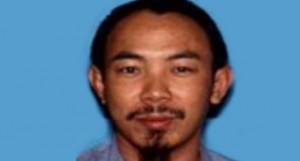MANILA, Philippines–Bad news for those who collected the reward.
A captured Abu Sayyaf commander told investigators that a top Southeast Asian terror suspect, who the military reported was killed in a US-backed air strike two years ago, is alive and being harbored by a hard-line Muslim rebel group in Mindanao, a confidential police report said.
The military’s intelligence chief also said it was unclear whether the terrorist, who had a $5-million price on his head, was killed because his body was not recovered after the air strike.
Abu Sayyaf commander Khair Mundos, who was arrested by police in a relative’s home in Parañaque City on June 11, traveled last year to a hinterland encampment of the Bangsamoro Islamic Freedom Movement (BIFF), a hard-line separatist group, in Maguindanao province where he met Marwan, a top Malaysian terror suspect whose real name is Zulkifli bin Hir, according to a police interrogation of Mundos, a copy of which was seen by The Associated Press (AP).
Instructor to rebel recruits
Suddenly, it is difficult to decide which tense to use in talking about Marwan—whether he was, or is, a bomb maker who belonged, or belongs, to the Indonesia-based Jemaah Islamiyah, the Southeast Asian affiliate of the global terror network al-Qaida.
Mundos said Marwan was with a Singaporean militant named Muhamda Ali, who used the guerrilla name Muawiyah, and another foreign militant, Amin Baco.
Mundos said he went to the BIFF camp to visit a local Moro rebel commander, to spend the holy Muslim fasting month of Ramadan and serve as a religious instructor to two batches of rebel recruits, who were undergoing bomb-making training.
‘Silent man’
Mundos described Marwan as a “silent man” while he said Muawiyah, a computer expert, was a friendly militant who wandered from hut to hut like “a politician.”
Marwan, who is on the FBI list of most wanted terrorists and has a $5-million bounty on his head, was reported by the military to have been killed, along with Muawiyah, in a Feb. 2, 2012, Philippine air strike on an Abu Sayyaf camp in Sulu province.
It is unclear whether the US government paid the reward and who collected it. The military assumes nobody came forward to claim the bounty because of the unclear outcome of the air strike.
The military said it had intelligence reports that Marwan survived the air strike but it would not change its statement that he was killed without convincing proof that he was still alive.
A military acknowledgment that Marwan is alive is crucial because it would allow the resumption of funding efforts to track and capture him.
No confirmation of death
The Armed Forces of the Philippines’ intelligence chief, Maj. Gen. Eduardo Año, said it was possible that Marwan survived the air strike and could be operating in the Cotabato-Lanao area, specifically in Maguindanao, together with 11 other members of the Jemaah Islamiyah.
“There is no confirmation that he died two years ago. [No body was recovered] at that time and [there was] no direct testimony that he was dead,” Año, chief of the Intelligence Service of the Armed Forces of the Philippines (Isafp), said in an interview.
“In the absence of confirming legal documents, there is a very strong possibility that Marwan is still alive,” he added.
Año said Isafp had sources who had contact with Marwan after the air strike.
“The Isafp assumes he is still alive and we are doing intensified, focused intelligence operations against the remaining [Jemaah Islamiyah operatives] in our country,” he said.
Mundos, described by the US state department as a key Abu Sayyaf leader and financier who was captured in 2004 but escaped from jail three years later, acknowledged his group had fallen into disarray, without a central leader, burdened by infighting and surviving largely on extortion and kidnappings, according to a police interrogation of Mundos, a copy of which was seen by AP on Wednesday.
Isolated by attacks
Mundos’ account echoes military and police assessments of the Abu Sayyaf, which they said had been weakened and isolated in remote jungle patches in the South by more than a decade of US military-backed assaults by Philippine troops.
While in police custody, Mundos acknowledged having arranged the transfer of funds from al-Qaida to the Abu Sayyaf to finance bombings and other terrorist attacks in the South, according to the US state department.
The Abu Sayyaf “has no central leadership,” Mundos was quoted in the report as saying, adding the militants “do not have direction” and are “engaging in extortion and kidnapping only to sustain their daily needs.”
A separate police intelligence report obtained by AP quoted informants as saying that Marwan visited a local militant’s residence in Maguindanao with security escorts in April.
The Abu Sayyaf is burdened by infighting, Mundos said in the report, adding that he was at odds with a younger commander, Puruji Indama, in their base in Basilan province.–With a report from AP


